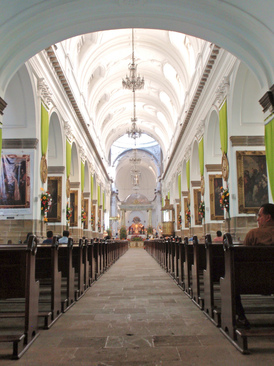
He was implying that religion is merely a choice, or as others have put it, you can’t pick your skin color, but you can pick your church.
You also, presumably, could choose not to go to church, which many would consider more convenient when it comes to expressing opinions on current events.
Attached to another recent story about an increase in violence toward religious people worldwide was a comment that said the persecution is happening because religions have overreached “into political and public policies and (are)
| | trying to force their beliefs on others.” And still another offered that, “A person can worship anything or anyone they want to in there(sic) house, church, or temple,” implying it is wrong to go into the public square and try to get others to worship the same way. If you must believe in God, keep it to yourself. I know, few things are less productive than spending time reading mostly anonymous online comments. These Rorschach-like missives should be taken with a grain of whatever mild spice is available. But they can reflect thought patterns and attitudes coursing through society’s collective arteries. In this case, they accurately outline an alarming and ill-informed trend. The United States is facing a crisis of sorts over religion. While much of the rest of the world is experiencing real and violent religious conflicts — some of it between religions and some imposed by the state — many Americans, it seems, are confused as to the very reasons to allow religious freedom in the first place, beyond as a sort of private out-of-the-way hobby people can engage in behind closed doors. And yet many believers will tell you that few things in life are as deep-seated or personal as religious conviction. To many people, their faith is more than just a hereditary fact (my dad, his dad, etc., belonged to this church, and so do I); it is more than just belonging to a social club; it involves the convincing power of some sort of life-changing spiritual experience. Scriptures describe many such experiences, from Moses and the burning bush to the Apostle Paul’s vision on the road to Damascus. Joseph Smith said he suffered persecutions from all sides but could not recant because, “…I had seen a vision; I knew it, and I knew that God knew it …” To many others of all religious faiths, conversion is a quieter, but no less convincing, thing. It becomes a fundamental part of their identities, informing how they think, act and believe, and what they consider to be universal truths. To say people can simply choose to believe differently and therefore should be persecuted for their beliefs is as unenlightened as it is dangerous. It also displays a galling ignorance of a fundamental principle in the American experiment. The First Amendment allows for the “free exercise” of religion. This cannot be done without allowing religious ideas into the public square and even the business world. The Founding Fathers understood the kind of trouble that could come from restricting religious freedom. They carefully established a Constitution that allowed Americans to balance their loyalties to God and country without forcing them somehow to compromise or weaken their devotion to God. As Jennifer A. Marshall, Director of the Richard and Helen DeVos Center for Religion and Civil Society at The Heritage Foundation, put it, “… the American Founders considered religious engagement in shaping the public morality essential to ordered liberty and the success of their experiment in self-government.” Courts are currently considering whether Washington can force religious employers to make contraception coverage available to their employees and whether public bodies can begin meetings with prayer. In many other issues of concern, religious people are struggling to be taken seriously in an atmosphere that marginalizes their views. Any observer of history or current world events ought to know what happens when governments seek to push aside what Martin Luther King Jr. said “must be the guide and critic of the state.” It doesn’t end well. |

 RSS Feed
RSS Feed

